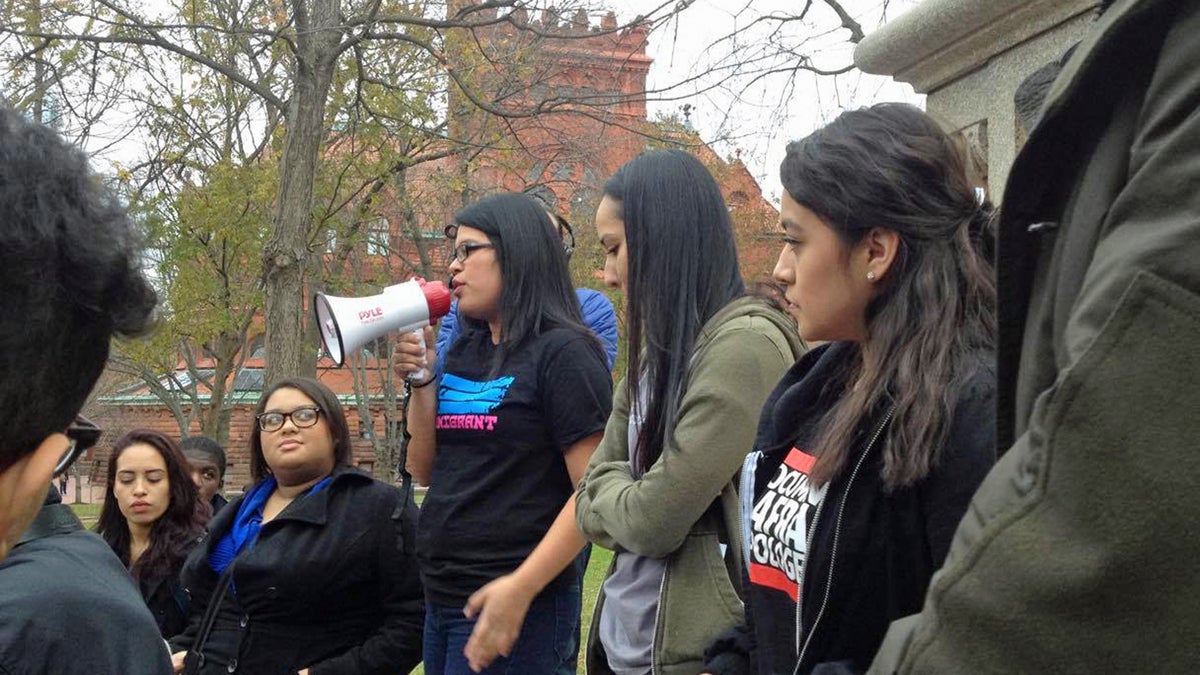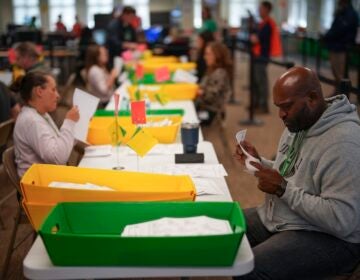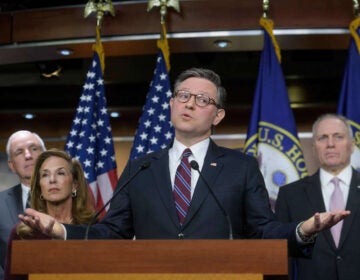After declaring as ‘sanctuary campuses,’ Penn, Swarthmore work on details
Listen
Daisy Romero
Daisy Romero has never shied away from telling people she is not authorized to be in the U.S.
“A lot of us identified as ‘dreamers,’ ” Romero said, referring to beneficiaries of the proposed Development, Relief, and Education for Alien Minors, or DREAM act. “I myself didn’t identify as a dreamer. My label, or how I identify myself, is undocumented.”
The 22-year-old political science major at the University of Pennsylvania has chosen to be upfront about her status to help push for policies to protect other immigrants.
One thing she and other students have been asking for is for Penn to become a “sanctuary campus” ahead of President-elect Donald Trump’s planned crackdown on illegal immigration.
Last week, Romero’s wish became a reality. On Thursday, the university’s president, Amy Gutmann, announced the school would “not allow Immigration and Customs Enforcement (ICE)/Customs and Border Protection (CBP)/U.S. Citizenship and Immigration Services (USCIS) on our campus unless required by warrant.
“Further, the University will not share any information about any undocumented student with these agencies unless presented with valid legal process.”
So far, Swarthmore College is the only other campus in the Philadelphia region to follow suit. What’s far more common is for college and university presidents to sign a letter calling for the federal government to continue the Deferred Action for Childhood Arrivals program, or DACA. It allows young people like Romero, brought into the country illegally as children, to study and work without fear of deportation.
She and other undocumented students at Penn still have a lot of questions.
For instance, Trump has promised to end DACA. Romero wants to know what Penn will do if that happens and she’s no longer authorized for the work-study program that helps pay for her education. She also wants to know what would become of students who are citizens, but whose parents face deportation.
“Let’s say their parents are undocumented and… if they are deported, how do you re-evaluate their financial aid here at the university and how quickly can the university do that?” she asked.
According to Gutmann’s statement, undocumented students would still qualify for work-study and the university would provide the aid necessary for them to complete their studies.
Romero said the administration has not responded to requests from her and other immigrant students to meet in person to hash out the details. Penn also declined our requests for an interview, saying Gutmann was unavailable.
What is a ‘sanctuary campus’?
Many colleges and universities around the country have different ideas what being a “sanctuary campus” actually means.
Most higher education administrators in the Philadelphia region are staying quiet on the topic, but many of them are among the more than 450 college and university presidents who have signed a nationwide petition supporting DACA and offering to meet with U.S. leaders about it. That includes Penn State, Saint Joseph’s, Villanova, Rutgers, Temple and the University of Delaware. The program affects 5,118 students in Pennsylvania, 1,363, in Delaware, and 20,308 in New Jersey, according to the latest federal statistics.
Princeton University president Christopher Eisgruber also signed the DACA petition, but has said he will not declare a “sanctuary campus.” In a letter to students last week, Eisgruber said immigration lawyers told the administration the concept has “no basis in law.”
That’s true, said Elizabeth Cohen, a political scientist at Syracuse University who studies immigration and citizenship.
“If somebody comes with a warrant or a subpoena, they’re going to have to make a decision and that decision, if they want to protect students, will require some really fancy legal work or civil disobedience,” Cohen said.
On Friday, Swarthmore College’s board of managers pledged to provide sanctuary to all students and community members. Citing its past support for conscientious objectors, it will not voluntarily allow immigration officials on campus or share student information with them.
It’s also forming a working group to address other issues. That could include finding ways to keep students in the country illegally employed if Trump repeals DACA and providing emergency housing for those who cannot go home during breaks.
Ivan Lomeli, a sophomore at Swarthmore and DACA recipent, said he also wants the college to help him figure out how to keep his plans to study abroad in Budapest, Hungary, next year.
Instead of getting to work on his applications, Lomeli said he is holding off to see what Trump’s immigration policies will be.
“I’m waiting until after the inauguration to see his first days in office and see what’s going on,” he said.
‘The power of purse strings’
Lara Cohen, an associate professor working on the effort at Swarthmore, believes the college can take pragmatic steps to help immigrant students have the same opportunities as their classmates — aside from limiting cooperation with federal immigration officials. But she also believes there is a higher purpose.
“I also think that there is a kind of political opportunity for schools of all kinds to publicly resist the kinds of policies that Trump is pursuing,” Cohen said.
But that resistance could come with a price.
John Sandweg, a former acting director of Immigration and Customs Enforcement under the Obama administration, said the agency rarely targets schools for immigration enforcement or asks about the status of their students as a matter of policy. He does not believe that will change, even under a hard-line Trump administration.
“At the end of the day, the federal government cannot compel these schools to share this information except through the power of purse strings,” Sandweg said.
Colleges and universities that adopt “sanctuary campus” policies could become subject to the same calls some politicians have made against “sanctuary cities” like Philadelphia to cut off their federal funding.
While there are no current threats to do so, these institutions have strong financial ties to Washington.
A major research hub like the University of Pennsylvania receives $700 million in federal grants each year. And if federal financial aid packages could not be used at “sanctuary campuses,” that could put them at a competitive disadvantage.
Money is likely a major factor as colleges and universities work out how far they’ll go to defend undocumented students.
But Elizabeth Cohen said the Trump adminstration could have a price of its own to pay should it choose to crack down on those pursuing higher education.
“These are in many cases people who are paying tuition, they’re paying taxes, they engage in consumer spending, and they fill important gaps in the labor market,” she said. “So as popular as it might be with some of Trump’s base, there are huge, huge destabilizing costs.”
WHYY is your source for fact-based, in-depth journalism and information. As a nonprofit organization, we rely on financial support from readers like you. Please give today.




